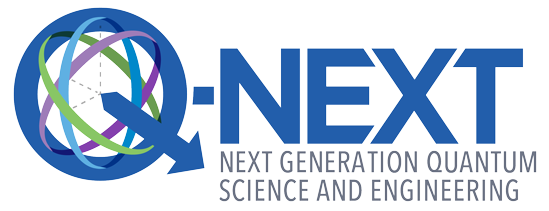spin qubits
-

Researchers invent new way to stretch diamond for better quantum bits
A team of researchers at the University of Chicago, Argonne National Laboratory and Cambridge University have announced a breakthrough in quantum network engineering: By “stretching” thin films of diamond, they created quantum bits that can operate with significantly reduced equipment and expense. The change also makes the bits easier to control. The researchers hope the findings, published Nov. 29 in Physical Review X, can make future quantum networks more feasible. Read More
-

Simulations reveal the atomic-scale story of qubits
From the University of Chicago: Researchers led by Giulia Galli at the University of Chicago report a computational study that predicts the conditions to create specific spin defects in silicon carbide. Their findings, published online in Nature Communications, represent an important step towards identifying fabrication parameters for spin defects useful for quantum technologies. Read More
-
Embracing imperfection for quantum technologies
From Physics Today: Q-NEXT Director David Awschalom co-writes a comprehensive rundown of the use of atomic defects as qubits. These solid-state spin qubits are unlocking applications in nanoscale quantum sensing and are at the forefront of creating distributed, long-distance entanglement that could enable a quantum internet. Read More
-
Cross-institutional collaboration leads to new control over quantum dot qubits
From the Chicago Quantum Exchange: Researchers at the University of Wisconsin–Madison, HRL Laboratories, and University of New South Wales collaborate to better control silicon quantum dot qubits, allowing for higher-quality fabrication and use in wider applications. Read More
-
Turning a million-qubit quantum computing dream into reality
From The Next Platform: Earlier this year, Intel announced that it had successfully fabricated more than 10,000 arrays, each with three to 55 quantum dots, on a 300-millimeter wafer with a yield higher than 95%. Q-NEXT collaborator James Clarke, director of quantum hardware at Intel, says the feat was made possible thanks to the fact that Intel, unlike most other companies pursuing quantum, runs its own fabs, which the company also used to manufacture the control logic needed that allows such a high density of qubits. Read More
-
Frozen neon invention jolts quantum computer race
From IEEE Spectrum: New findings from Argonne National Laboratory and the University of Chicago suggest that electrons trapped on frozen solid neon could prove a simple yet powerful kind of qubit for use in future quantum computers. Read More
-
U of C researchers make quantum breakthrough
From Crain's Chicago Business: University of Chicago researchers say they’ve made a breakthrough that might help bring quantum computing closer to reality. Researchers achieved a record time for memory, or “coherence,” in quantum bits, or qubits, of more than 5 seconds. Scientists are trying to harness quantum mechanics for the next generation of computing. One of the challenges is that particles maintain their quantum states, and their ability to store information, only briefly. Read More
-

Researchers set record by preserving quantum states for more than 5 seconds
A team of researchers at Argonne National Laboratory and the University of Chicago achieved two breakthroughs to overcome common challenges for quantum systems. They were able to read out their qubit on demand and then keep the quantum state intact for over five seconds — a new record for this class of devices. Read More
In the News
See all In the News-
The best qubits for quantum computing might just be atoms
From Quanta: Mark Saffman of the University of Wisconsin–Madison and Infleqtion is featured in this comprehensive overview of neutral-atom qubit research. Read More
-
How quantum computing could help us understand the universe
From PBS NewsHour: David Awschalom appears in this piece on the next generation of computing, one that will be far more sophisticated and dependent on understanding the subatomic nature of the universe. Read More
-
PME-led research into protein-based qubits earns $2.75M Moore Foundation grant
Bolstered by a new $2.75 million grant from the Gordon & Betty Moore Foundation, a team led by University of Chicago's Peter Maurer will soon study qubits made from protein. Read More
-
Infleqtion unveils 5-year quantum computing roadmap, advancing plans to commercialize quantum at scale
From Quantum Insider: Infleqtion shares a broad business update, including the first look at its new 5-year quantum computing roadmap. The roadmap's centerpiece is Sqorpius, the next phase of Infleqtion’s quantum computing program. Read More
-
Bringing quantum entanglement to the people
From the National Science Foundation: NSF’S Quantum Leap Challenge Institute Hybrid Quantum Architectures and Networks at the University of Illinois Urbana-Champaign, a Q-NEXT partner, has created a working demonstration that brings entanglement between photons to a public setting for the first time. Read More
